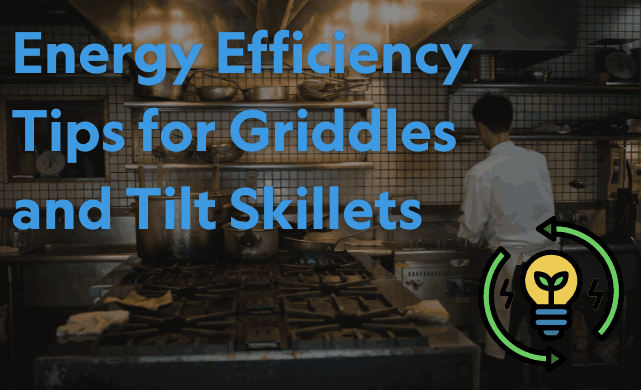Big pieces of equipment demand substantial energy to get powered up and running smoothly. However, how effectively you run that equipment is significantly influenced by how well you maintain, clean, and care for it, along with the manner in which you operate your restaurant gear. Here are some practical tips that you can incorporate into your foodservice kitchen specifically to enhance the energy efficiency of your commercial griddles and tilting skillets or braising pans. • Ensure all staff provide sufficient preheating time at startup for griddles or braising pans. • Monitor the temperature to avoid overheating your commercial cooking appliances. • Review your menu and adjust the temperature settings for each section, ensuring it’s not hotter than what the food needs. • During slower periods, reduce or turn off the controls on unused sections of your griddle or tilt skillet, but don’t fully shut off the equipment if you’ll need it later that day. • Load food over thermostat probes for better results. • Avoid using ice on the griddle surface as it can lead to buckling of the plate. • Make sure to season the griddle surface after every thorough cleaning session. • Opt for thermostatically controlled griddles, as they save energy and cost less to operate. • Scrape the cooking surface between food items. Some surfaces might need specific tools, so consult the manufacturer's user manual. • Scratches and nicks on your griddle surface can result in carbon buildup and cause food to stick. Regularly inspect spatulas, scrapers, and other utensils for rough areas and replace them when necessary. • Grooved griddles consume up to 40% less natural gas than underfired broilers. • Check your flame and ensure it’s blue, not yellow. A yellow flame indicates a potential issue and requires professional servicing. We hope these tips assist you in conserving energy in your foodservice kitchen. Keep in mind that advancements in technology are consistently making commercial foodservice equipment more efficient. It’s always beneficial to explore newer equipment options on the market, even if your existing equipment is still functional. The utility savings and potential tax incentives could make upgrading worthwhile.

Keywords: energy efficiency
While these strategies can help optimize energy usage in your kitchen, remember that continuous learning about new technologies and best practices in foodservice management is key to long-term success. Engaging with industry experts and attending relevant workshops or seminars can further equip you with valuable insights and tools to keep your operations efficient and sustainable.Stainless Hot Water Storage Tank,Stainless Steel Stirring Rod,Stainless Steel Concrete Mixerportable Concrete,The Use Of Concrete Mixers
Weifang Yida Mould Co.,Ltd , https://www.wfyidamold.com




